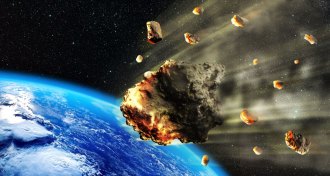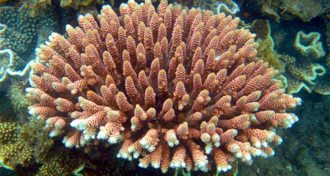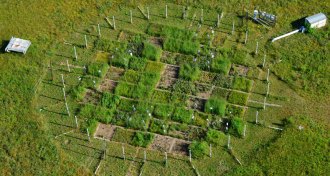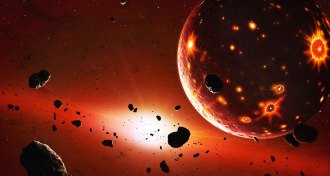News
-
 Earth
EarthPumping water underground for power may have triggered South Korean quake
A 2017 South Korean earthquake may have been caused by human activities, two new studies suggest.
-
 Tech
TechWebsite privacy policies don’t say much about how they share your data
Privacy policies don’t reveal the half of how websites share user data.
-
 Environment
EnvironmentThis plastic can be recycled over and over and over again
A new kind of polymer is fully recyclable: It breaks down into the exact same molecules that it came from.
-
 Psychology
PsychologyIn China, coffee shop habits show cultural differences tied to farming
Farming histories have shaped behavior in northern and southern China.
By Bruce Bower -
 Planetary Science
Planetary ScienceAsteroids could have delivered water to the early Earth
Shooting mineral pellets at a simulated planet suggests an impact wouldn’t have boiled all of an asteroid’s water away.
-
 Quantum Physics
Quantum PhysicsSpooky quantum entanglement goes big in new experiments
Scientists entangled the motions of two jiggling devices that are visible with a magnifying glass or even the naked eye — if you have keen vision.
-
 Archaeology
ArchaeologyClues to an Iron Age massacre lie in what the assailants left behind
Ancient Scandinavian massacre may reflect power struggles after Rome’s fall.
By Bruce Bower -
 Health & Medicine
Health & MedicineThe first penis-scrotum transplant is the latest to go beyond lifesaving
Advances that give patients new faces, hands and more aim to improve quality of life
-
 Climate
ClimateHeat waves are roasting reefs, but some corals may be resilient
The latest research on coral reefs clarifies the devastation of heat waves and looks at how coral might be able to adapt to warming waters.
By Dan Garisto -
 Climate
ClimateRising CO2 levels might not be as good for plants as we thought
A 20-year experiment spots a reversal in the way two kinds of plants take up extra carbon from the atmosphere.
-
 Planetary Science
Planetary ScienceThis meteorite’s diamonds hint that it was born in a lost planet
Bits of metal nestled inside diamonds suggest the space rock could have formed in a Mars-sized protoplanet in the early solar system.
-
 Tech
TechWhy touch can be such a creepy sensation in VR
Touch sensation in VR can go from immersive to unnerving as the feeling gets more realistic, if you can’t see the source.